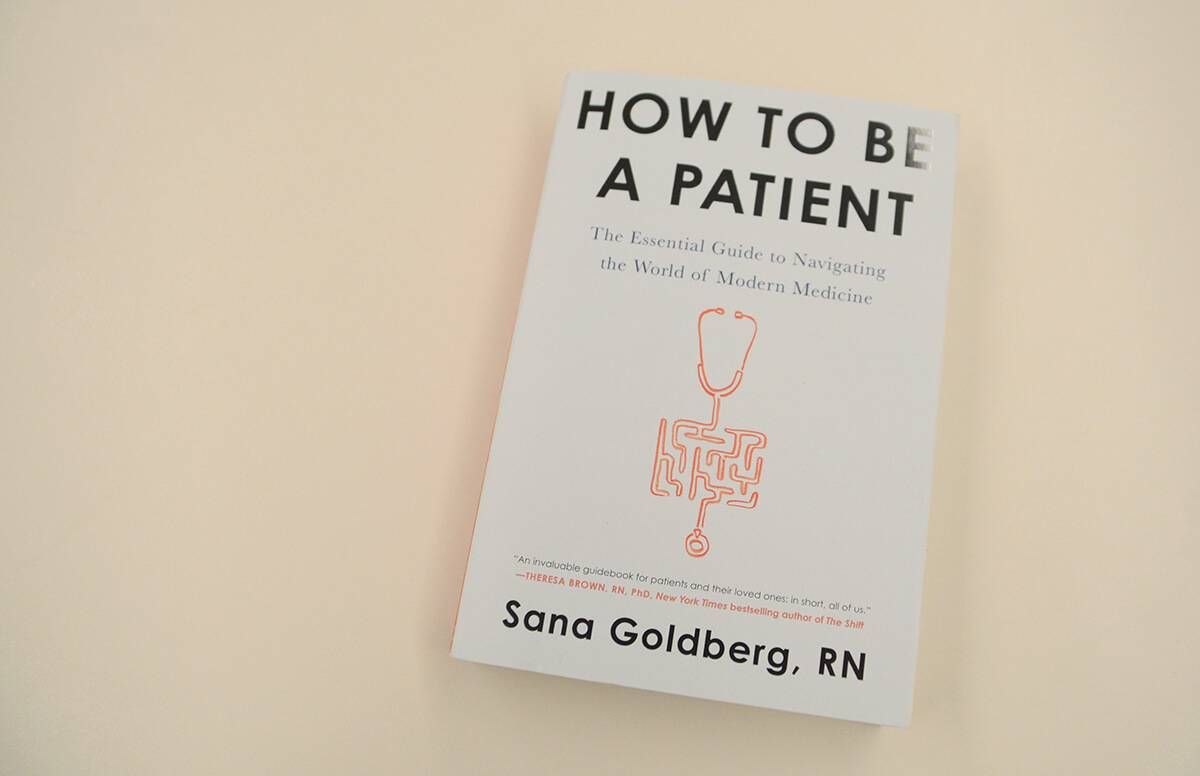How to Be a Patient: A Comprehensive Book on Exactly That
The author, a nurse, gives an inside scoop on modern medicine

Around the time Sana Goldberg began nursing school, her grandfather had a serious, undetermined health problem.
"I remember from the moment of entering the ER to the week later when he was dismissed from the hospital — having such a sense of confusion about what was going on," Goldberg, a nurse who practices in New Haven, Conn., recalls.
Although Goldberg's mom was a doctor and Goldberg herself had worked extensively in hospitals and been around this, she'd never before been so intimately connected to the process of dealing with a significant medical issue.
To have a really solid primary care provider is too important to compromise on.
"Because I'm a reader, I went and looked for books, and I couldn't find much that I felt like was a really good resource," Goldberg says. "There are a lot of books out there about hospital safety or how to communicate better with your doctor. But they all were sort of paternalistic and didn't really get at the core of what I was trying to figure out."
It hit Goldberg that this kind of "how to" information — all compiled into one place — would be profoundly useful for people to have on hand.
"I thought it would be really great if this could be distilled and given to patients because the health care climate is really difficult right now for a lot of people. And so to have better tools to interface with that — I think people are wanting to have that."
Her book, How to Be a Patient: The Essential Guide to Navigating the World of Modern Medicine, breaks down a wealth of information and expertise into easy-to-understand (and easy-to-find in times of stress) chapters and sections like "How to Choose a Primary Care Provider" and "When You Can't Get a Diagnosis."
Chapter 23 goes in-depth on "When You're Getting Older (Or When It's Your Parent)," with plentiful guidance on switching to a geriatrician, mental health and loneliness, transportation, end-of-life choices and more.
This is the type of book you keep in a handy place and reference as life happens and issues come up. It's friendly, approachable, realistic and takes into account the ways modern medicine is not always fair to patients of various genders, sexual orientations, races and ethnicities. Next Avenue asked Goldberg to expand on some of the most intriguing and relevant parts in her book:
Next Avenue: In the book you discuss 'unlearning' things. What are some of the main things you'd like people to unlearn about health care and how it works?
Sana Goldberg: Unlearning the idea that your role as a patient is to be passive and be a recipient of directions and orders. You show up at the doctor, they tell you what to do, you never question somebody in a white coat. This system then becomes really intimidating and you don't question it, and it becomes OK that a lot goes on that you might not understand.
Knowing that you have agency during medical encounters is really important, and to unlearn this deference to medical providers.
Self-advocacy at the doctor is intimidating for a lot of people. What do you recommend to people who are scared to speak up or ask questions that might seem accusatory or like they're questioning the doctor's authority?
What I always tell people first is to acknowledge that the system is imperfect. Even a doctor that you have a lot of trust in is still working within a system that's imperfect.
So it's OK to think of yourself as working with them to figure something out rather than directly challenging their authority.
I tell people it really helps to write down your concerns or questions before you go in rather than being on the spot and knowing the clock is ticking. Think about what you want to say and have that in your mind before you go in.
And having an advocate with you can help to bolster your courage in a situation — to feel supported by somebody.
Your book has an entire section about bringing an advocate to the doctor. You suggest always bringing an advocate to appointments and you detail who that person can be and how you can choose them. Some people might be nervous to bring an advocate to appointments, especially if they feel like they should be able to do everything themselves. Why is it so important for people to bring an advocate along?
I get questions about this a lot. [Needing an advocate] is a really strange statement to make and I think it's pretty foreign, especially for a high-functioning adult or someone thinking about privacy.
My goal is to get people to reframe how they think of their health care and how they interact with their health care. And so to have a consistent person who is up to speed on what's going on with your health care — the long-term goal is that you have a person who can build a relationship with your providers and be your advocate if something more pressing comes along.
In a hospital setting, it's really important to have another pair of eyes. In an appointment, the same thing holds because it's usually such a short time period.
A lot of times, people are nervous because it's intimidating to be around medical professionals. Or people feel like they've been waiting so long to get an answer and [the doctor] is the person who can help, and they've got to make the most of this. It can be daunting.
Have another person who can remember a question you might've forgotten to ask or who can be there just to receive information that you might not be able to pay attention to because your mind is on other things.
Something we hear from readers is that it's difficult to communicate with doctors and feel like you have enough face time with them. You touch on this in the book. What's your advice?
Before you go in, think about the timeline of your symptoms. So rather than saying, 'This started hurting, I don't know, sometime last August,' you're able to talk about the frequency of the pain, how long it lasts and what you've tried to do to remedy it that hasn't worked. Really thinking dynamically about the problem you're going in for and having prepared a little elevator pitch of how to talk about it.
The second thing I would say is being comfortable asking questions — and not only just asking questions and getting answers, but being sure that when you're given an answer, it's given to you in a way that you can understand.
As medical professionals, we work a lot on health literacy and making sure on our end that we're not just speaking gibberish over somebody's head. But patients are really reluctant. There's this eagerness to please and just say, 'Yeah, I understand,' even if you don't know because it wasn't communicated very well. So just keeping in mind that it's OK to say, 'Can you explain that in another way? I didn't understand.'
The last thing is feeling comfortable reining the conversation back in if you feel like it is going somewhere that wasn't the place that you intended or something that you brought up wasn't prioritized in the way you hoped.
What should you do if a doctor isn't responding well when you speak up or ask questions?
Firs,t try some of those skills like challenging something or trying to redirect the conversation. But ultimately my stance is that if you don't feel like you're heard or you can't have a productive conversation when you're trying to communicate with your provider, then it's probably good — especially if it's a primary care provider — to find somebody that you can communicate with.
And that's especially important if you're older and you have different parties involved in your care and you have to be this conduit of information between them.
To have a really solid primary care provider is too important to compromise on. You can try to advocate and have agency in those interactions and use the tools that are in the book, and then if it doesn't work, I always think it's OK to find somebody new.
Editor’s note: This story is part of a series for The John A. Hartford Foundation.


